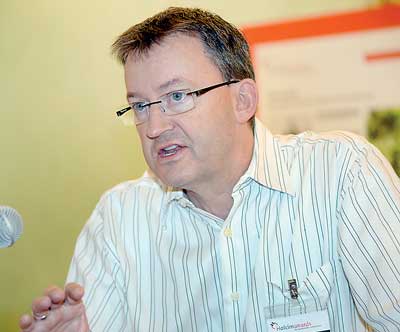Sunday Feb 22, 2026
Sunday Feb 22, 2026
Wednesday, 16 September 2015 00:00 - - {{hitsCtrl.values.hits}}
A Sri Lankan architectural practice has received international recognition at the 2015 Global LafargeHolcim Awards for Sustainable Construction, earning the prestigious Silver Award for a community library project on an Army base in the rural town of Ambepussa.
The project, aimed at building post-war skills and reintegrating soldiers into society, marked the first time a Sri Lankan practice was named a winner at the LafargeHolcim Awards for Sustainable Construction.
During a recent visit to Colombo, Edward Schwarz, General Manager of the LafargeHolcim Foundation for Sustainable Construction, explained the competition’s objectives: “The Foundation is a non-profit organization that aims to promote sustainable construction globally. Through the Awards, we collect, evaluate and reward projects on regional and global levels that are at the forefront of innovation in sustainable construction. We are able to showcase excellent examples of sustainability in practice, like this one here in Sri Lanka.”
Held every three years, the international Awards competition has been conducted by the LafargeHolcim Foundation since 2003 and offers $ 2 million in prize money, for architectural design interventions that address sustainable building and construction issues worldwide.
Commenting on the nature and selection of projects, according to Schwarz, the latest competition received over 6,000 entries. “Every region has an independent jury of representatives from architecture, engineering, NGOs and other specialists, who evaluate and select regional prizes. The three main winners from each region of the world in 2014 automatically qualified for the global competition in 2015,” Schwarz said.
Explaining the winning project’s contribution and recognition as an architectural intervention that delivers tangible benefits to the local community, Schwarz said, “We take a step back and look at sustainability in a holistic way. The library in Ambepussa is built mainly of clay, stones, recycled wooden railway sleepers and other local materials. It is this combination of materials, architectural design, and the social strategy of this project that set it ahead of the pack.”
Architects Milinda Pathiraja and Ganga Ratnayake of Robust Architecture Workshop in Colombo, designed the community library project showcasing an excellent example of sustainable construction, built with assistance by young army men trained in building techniques. The soldiers who worked on building the library have acquired new skills that will ease their transition back into civilian life.
Commending the project, Schwarz said: “The independent global jury decided that this Sri Lankan project was ranked amongst the best submissions. The project was a concept on paper when it entered the competition, but now it’s already completed, and we were delighted to be able to hold the prize hand-over ceremony in the winning building.”
According to Schwarz, the project overcomes challenges by incorporating sustainable development and architectural excellence that will improve the quality of life of the community. He says: “This is a clever design that is aware of its place, materials and community and thereby adds a lot to sustainability.”
He elaborated: “The Ambepussa project re-skilled former soldiers in building techniques. Educating them in construction so in the future, they have a vocation. The project used stones and clay from the site to significantly reduce materials costs, as well as recycling old railway sleepers as elements of the floor. They used low-cost local materials, and the result is a beautiful building with outstanding durability.”
Reiterating the Foundation’s ethos, Schwarz said: “Construction is only sustainable if it performs on economic, environmental, and social levels. But in addition, there must be a high degree of innovation and transferability. Through the Awards we aim to accelerate the transfer of ideas to other building contexts and locations worldwide – so we can all benefit from bright ideas like the library in Ambepussa.”
As a trusted supplier of cement, Holcim is embedded in the hearts and minds of the people in Sri Lanka. One in three homes in Sri Lanka use building materials from Holcim, a profound testimonial of the company’s credentials in the marketplace.